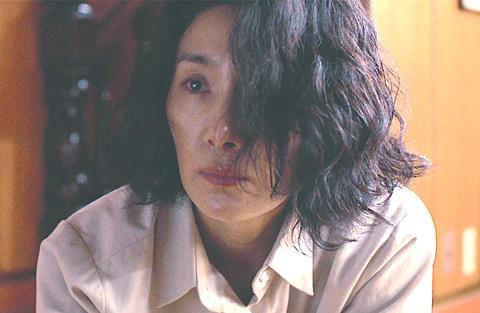An ambitious and increasingly discombobulating debut from Lee Sol-hui can look forward to further festival play

Dir: Lee Sol-hui. South Korea. 2022. 100mins
A spirallingly implausible but engrossing psychological drama with aspects of thriller and undertones of dark comedy, writer-director-editor Lee Sol-hui’s feature debut Greenhouse can perhaps best be described as what might happen were Lee Chang-dong to film a screenplay co-written by John Waters and Francois Ozon. Bowing in the Korean-showcase sidebar at Busan, this ambitious mixture of genres can certainly expect further festival play.
Lee’s directorial style is consistently and resolutely deadpan
Kim Seo-hyung dominates proceedings as fortyish Moon-jung, a well-meaning, self-effacing and essentially decent lady to whom life has dealt a punishingly unfair hand. Ever-luckless in romance, she is the devoted single parent to a surly teenage son serving a sentence in juvenile detention (we never find out the exact nature of the lad’s crime). Temporarily resident in a remote, converted greenhouse — similar to the kind which featured so prominently in Lee Chang-dong’s Burning — Moon-jung counts every penny so that she can afford a new flat for herself and her son following his impending release.
Prone to spells of self-harm (which manifest as violent slapping), Moon-jung works long hours as a carer at the home of elderly couple Tae-jung (Yang Jae-sung) and Hwa-ok Lee (Shin Yeon-sook). He is blind, she has Alzheimer’s disease, can be quite a handful and suffers from the paranoid delusion that Moon-jung wishes to kill her. Moon-jung is also distraught and guilt-ridden by the plight of her aged mother (Won Mi-won), who lives miserably in a nursing home. Unable to afford a psychiatrist, Moon-jung enrols at a therapy group for self-harmers where she befriends a meek but clingy younger woman, Soon-nam (Ahn So-yo).
The fates of all these troubled characters painfully intertwine over the film’s 100 minutes, at the end of which many are no longer in the land of the living. Once the bodies start piling up around the 40-minute mark, Lee’s script relies squarely upon contrivance and coincidence. She displays blithe disregard towards conventional considerations of believability both on the level of incident and of character; several plot-points hinge, for example, on individuals apparently lacking any olfactory sense.
But despite the increasingly wild and even absurd nature of what transpires — shading towards farce on occasion, with a cumbersome cadaver stashed in a wardrobe, a daft scheme involving switched identities, and then the most grotesquely ironic finale since Frank Darabont’s The Mist — Lee’s directorial style is consistently and resolutely deadpan. Keeping Kim Hyun-do’s score to a welcome minimum, she works with a downbeat palette of greys, blues and beiges, maintaining a steely, poised style to evoke a mood of dysfunction, desperation and inevitable tragedy.
The overall effect is disconcerting and even discombobulating, accentuated by the occasional habit of Lee (working as her own editor) of cutting scenes short just a beat or two before we expect. First-time writer-directors editing their own work is seldom a recipe for success, but Greenhouse indicates that Lee is talented in all three disciplines — even if they perhaps don’t quite gel together in entirely satisfactory fashion this time.
One auspicious sign for her future career is the way she elicits such strong, complimentary performances across the board, with Kim rising to the challenge of a very juicy lead role and veteran Yang stealing the show with his touching and nuanced turn as her benign, beleaguered employer.
Production company: KAFA (Korean Academy of Film Arts)
International sales: Finecut Co Ltd, hjlee@finecut.co.kr
Producer: Kang Kyung-il
Cinematography: Hyung Bow
Production design: Lee Hee-jeong
Editing: Lee Sol-hui
Music: Kim Hyun-do
Main cast: Kim Seo-hyung, Yang Jae-sung, Shin Yeon-sook, Won Mi-won , Ahn So-yo















![[L-R]: Amanda Villavieja, Laia Casanovas, Yasmina Praderas](https://d1nslcd7m2225b.cloudfront.net/Pictures/274x183/6/4/1/1471641_pxl_20251224_103354743_618426_crop.jpg)








